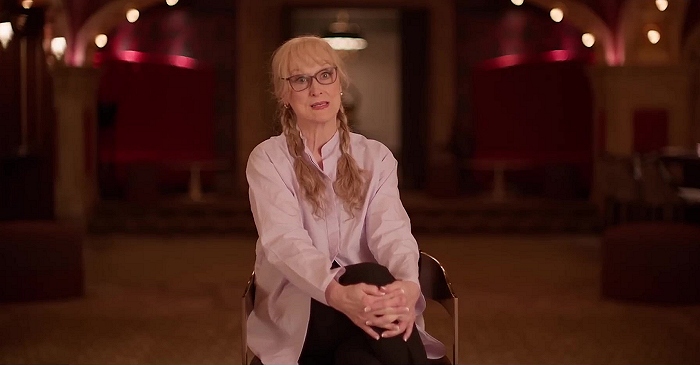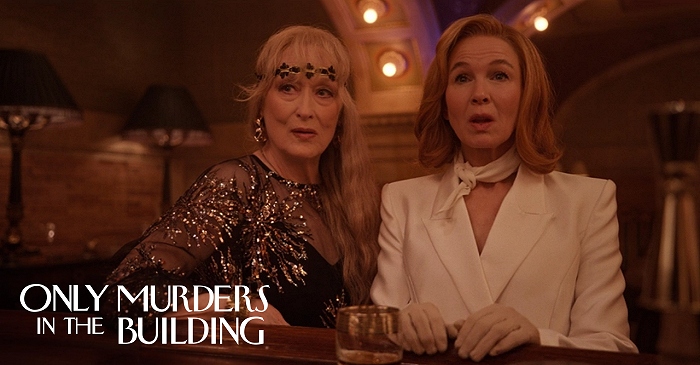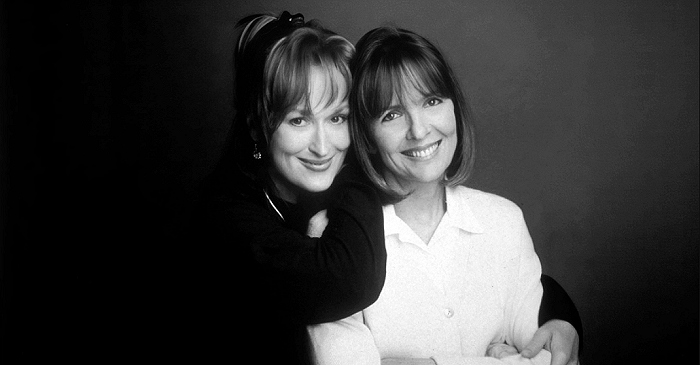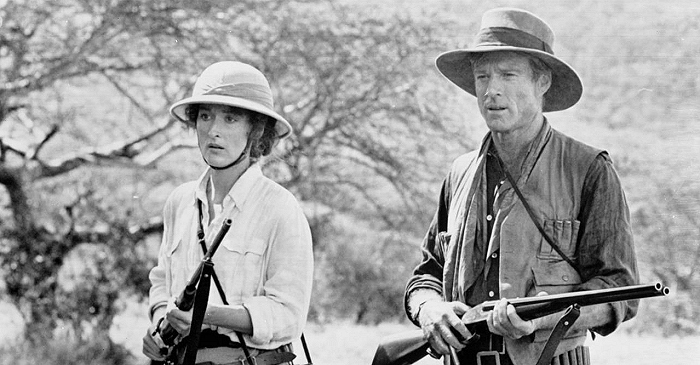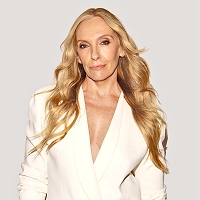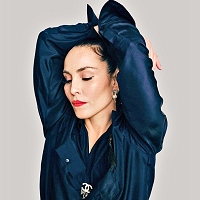|
Simply Streep is your premiere online resource on Meryl Streep's work on film, television and in the theatre - a career that has won her acclaim to be one of the world's greatest living actresses. Created in 1999, Simply Streep has built an extensive collection over the past 25 years to discover Miss Streep's body of work through thousands of photographs, articles and video clips. Enjoy your stay and check back soon.
|
|
Meryl Streep aims to get it right
The Chicago Tribune ·
December 26, 2002
· Written by Gene Seymour
| ||
She insists she isn’t quite the scientist everyone assumes her to be. And as you nod indulgently to Meryl Streep, the thought bubble over your head replies: “OK, fine, you know better than most that no one is what he or she is assumed to be, so let’s assume, for the moment, that you’re not as much into research and preparation as your reputation would imply. And we’ll assume that our chances of becoming the next governor of Nevada improve with each week’s straw poll.” Which might be more weight than a thought bubble should carry, but, really, who’s kidding whom? This is the same Meryl Streep who learned to play the violin before playing a music teacher in 1999’s “Music of the Heart” and who schooled herself rigorously in the art of Irish step dancing for 1998’s “Dancing at Lughnasa.” She’s been known to work over a character’s dialect with the same meticulous intensity as a slalom racer waxing her skis the night before an Olympic trial. The best-actress Oscar she won for playing a Polish Holocaust survivor in 1982’s “Sophie’s Choice” is merely the most conspicuous reward she’s received for such dedication to Getting It Right. Diving in with emotions
To all of which, Streep cops a guilty plea. “None of that is a waste of time,” she says. “But the process is really so much less . . . clinical than people make it sound. So much of it is simply diving in with your emotions and feeling your way around. I’m really more of a jump-in kind of person. I like it to happen instinctually. You have to give in to the moment, because you can never get yourself truly ready to be who you’re going to be.” This seems especially persuasive in reference to Streep’s two new films. In “Adaptation,” she plays journalist Susan Orlean, whose book, “The Orchid Thief,” is giving fits to screenwriter Charlie Kaufman (Nicolas Cage), who’s going through mental and emotional purgatory trying to adapt it for the movies. The film is written by the real Charlie Kaufman and directed by Spike Jonze, whose previous collaboration was the comparably exotic blend of the real and fanciful, “Being John Malkovich” (1999). Then there’s “The Hours,” the much-anticipated film version of Michael Cunningham’s Pulitzer Prize-winning novel that was inspired by Virginia Woolf’s 1925 classic, “Mrs. Dalloway.” The film, directed by Stephen Daldry (“Billy Elliot”), opens in Chicago Friday and boasts the formidable marquee tandem of Streep, Nicole Kidman and Julianne Moore, each of whom plays the lead in three separate, interwoven stories from different eras. Kidman plays Woolf, struggling with her novel in Britain circa 1924, while Moore plays Laura Brown, a housewife in early 1950s Los Angeles who is reading Woolf’s book while staving off feelings of emotional suffocation. Streep takes center stage in the more contemporary of the three stories, playing New York publisher Clarissa Vaughan, who shares Mrs. Dalloway’s first name and who, again like Mrs. Dalloway, is having an emotionally turbulent time planning an elaborate party for someone – in this case a poet and onetime lover, Richard (Ed Harris), who is dying of AIDS. It’s almost taken for granted that either “Adaptation” or “The Hours” (more likely the latter) will earn Streep her 13th Academy Award nomination. (She also won a best supporting actress Oscar for her role as the estranged mom in 1979’s “Kramer vs. Kramer” a year after being nominated for the same award for her work in “The Deer Hunter.”) Whether it happens, her unofficial title as Our Greatest Living Film Actress can only become more solidified than ever in the American mind. Even when the title is, almost always, attached with the qualifying “Arguably,” it tends to contribute to the prevailing image of Streep among fans and skeptics alike as a monument of some kind, imposing, formidable and (as her critics have often contended) more than a little remote. Up for a joke
And yet, the woman seems anything but remote or imposing. Even toward the home stretch of a long, hard day (which began that morning with work on the forthcoming film of Tony Kushner’s “Angels in America”), Streep, who’s 53, seems up for hearing a good, long joke, even one with an indigo punch line. But it’s important to note that, despite what you may have heard or divined from critics and others, she really likes to have fun with what she’s doing. With “Adaptation,” for instance, in what is surely the most erotic part she’s had since her dalliance with Clint Eastwood in 1995’s “The Bridges of Madison County,” she seems to have a ball. “Did it look as if I was having fun? I was. Those boys [Jonze, Kaufman and Cage] were a riot! And not only was the material fun, it was beautifully thought out.” Most of the questions she’s fielding that day, however, are about “The Hours.” She’s asked about the extent to which Clarissa Vaughan’s character required as much preparation as, say, the aforementioned music teacher in “Music of the Heart.” “Not as much as everyone seems to think,” she says. “In other words, I didn’t go back and read `Mrs. Dalloway.’ I should have. Maybe. But for me, or, really, my character, the whole `Mrs. Dalloway’ thing is a bit of an indictment from Richard. And I think it’s precisely for that reason that she wouldn’t go back and read it herself. She’d be familiar enough with the allusion, but she’d hesitate.” Was it easier than usual to, as she put it, “jump into” Clarissa’s skin because of what they have in common? After all, they’re both New Yorkers, both mothers (Claire Danes, who’s now attending Streep’s graduate alma mater, Yale University, plays Clarissa’s daughter in the film) and have shared jolting transitions among friends. “Yeah, she’s not too far afield from my experience, although at her core she’s very different from me,” Streep says. “And where I locate the biggest difference is that she lives very much in a golden moment somewhere in her early 20s. A lot of people seem to feel that they only really lived somewhere far from the present. Like high school, you know, glory days. When the best music and the best movies ever happened and nobody can convince you otherwise 40 years on. And that’s very far from where I am.” `A good year’
You don’t look back, say, at 1979, the year of that first Oscar, as a golden moment? “No, I’m so glad . . . well, 1979 was a good year for me. But I don’t live as connected to [the past] as she does. I’m busy as she is, but I’m totally engrossed in what I have to do each moment that I can’t indulge in that. “And by the way,” Streep adds, “she has a much bigger apartment than I do.” She laughs, “I mean, a seating plan for a party in a Manhattan apartment? Excuse me?” She makes these conversational side-trips so easily that you don’t know whether to be disarmed or resentful that someone so accomplished and intelligent could be so – what? – human? Well, yes, and you get the idea that it’s something she insists on. “I mean, look, people have these feelings about me that I’m a super intellect. I guess it’s because of my going to Vassar and Yale. But for all the degrees and honoraria, I’m very much in my life.” She pauses. “I deal with the kitty litter. I clean out the clumps.”






